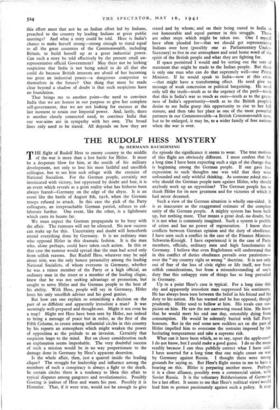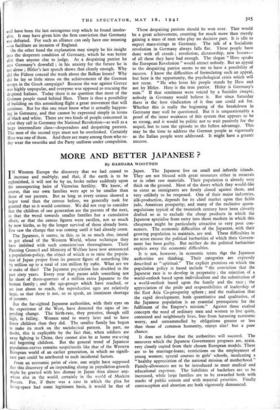THE RUDOLF HESS MYSTERY
By HERMANN RAUSCHNING
rp HE flight of Rudolf Hess to enemy country in the middle JL of the war is more than a lost battle for Hitler. It must be a desperate blow for him, at the zenith of his military development, not only to lose his most faithful and unselfish colleague, but to see him seek refuge with the enemies of National Socialism. For the German people, certainly not intoxicated with victory, but oppressed by doubt and fear, it is an event which reveals as a grim reality what has hitherto been always feared—Germany on the edge of the abyss. It is an event like the battle of August 8th, 1918, when the German troops refused to attack. In this case the pick of the Party colleagues, an irreproachable German patriot, refuses to col- laborate further. One event, like the other, is a lighthouse which casts its beams far.
We must expect the German propaganda to be busy with the affair. The rumours will not be silenced. No new success can make up for this. Uncertainty and doubt will henceforth attend everything done by Germany. It is no ordinary man who opposed Hitler in this dramatic fashion. It is the man who, alone perhaps, could have taken such action. In this or that case the rumour would spread that the man had acted only from selfish reasons. But Rudolf Hess, whatever may be said about him, was the only honest personality among the leading National Socialists, of whom everyone in Germany, whether he was a minor member of the Party or a high official, an ordinary man in the street or a member of the leading clique, knew that he was not seeking advantage or promotion, but sought to serve Hitler and the German people to the best of his ability. With Hess, people will say in Germany, Hitler loses his only unselfish adviser and his good genius.
But how can one explain so astonishing a decision on the part of so diffident and apparently irresolute a man? It was seemingly well-prepared and thought-out. Might it not even be a trap? Might not Hess have been sent by Hitler, not indeed to bring a message of peace but in order, as the first of the Fifth Column, to create among influential circles in this country by his reports an atmosphere which might weaken the power of opposition as the prelude to an invasion. Certainly that suspicion leaps to the mind. But on closer consideration such an explanation seems improbable. The very doubtful success of such a mission would be in no way proportionate to the damage done in Germany by Hess's apparent desertion.
Is the whole affair, then, just a quarrel inside the leading clique? The struggle for leadership and influence among the members of such a conspiracy is always a fight to the death. In certain circles there is a tendency to liken this affair to typical disputes among gangsters and revolutionaries. Possibly Goering is jealous of Hess and wants his post. Possibly it is Himmler. That, if it were true, would not be enough to give the episode the significance it seems to wear. The true motives of this flight are obviously different. I must confess that for a long time I have been expecting such a sign of the 'change that is beginning among the German people. If one gave free expression to such ' thoughts one was told that they were unfounded and only wishful thinking As someone asked me— why should the German people turn against Hitler, why should anybody work up an opposition? The German people has to thank Hitler for its new greatness and for victories of which it had never dreamed.
Such a view of the German situation is wholly one-sided. It is as inaccurate as the exaggerated estimate of the complete unity of tSe German people. A mighty system has been built up, but nothing more. That means a great deal, no doubt, but it is not what is commonly imagined. Such a system is prolific of crises and has no power of regeneration. I know these conflicts between German opinion and the duty of obedience. I have seen such a conflict in the case of the Finance Minister, Schwerin-Krosigk. I have experienced it in the case of Party members, officials, ordinary men and high functionaries in Germany. I believe that even Englishmen will understand that in this conflict of duties obedience prevails over patriotism— over the "my country right or wrong" doctrine. It is not only out of fear of the loss of civic rights or life itself, nor from selfish considerations, but from a misunderstanding of one's duty that this unhappy state of things has so long prevailed in Germany.
Up to a point Hess's case is typical. For a long time this shy and apparently irresolute man suppressed his sentiments. He has always been torn between the belief in his friend and his duty to his nation. He has warned and he has opposed, though prudently. Hitler used to bellow at him. His rivals cast sus- picion on him. He saw the net narrowing round him. He knew that he would meet his end one day, ostensibly dying from consumption. He would be solemnly buried with full Party honours. But in the end some new reckless act on the part of Hitler impelled him to overcome the restraint imposed by his hesitating temperament and take a supreme risk.
What can it have been which, so to say, upset the apple-cart? I do not know, but I could make a good guess. I do so the more readily because I can thus publicly correct what I have said. I have asserted for a long time that one might count on war by Germany against Russia. I thought there were strong grounds for saying so. But Hess's flight seems to me to have a bearing on this. Hitler is perparing another move. Perhaps it is a close affiance, possibly even a commercial union, with Soviet Russia. It is the voluntary Bolshevisation of Germpny for a last effort. It seems to me that Hess's political views would lead him to protest passionately against such a policy. It may well have been the last outrageous step which he found intoler- able. It may have given him the firm conviction that Germany was defeated. For such an alliance, can only have one meaning —to facilitate an invasion of England.
On the other hand the explanation may simply be his insight into the desperate condition of Germany, which he was better able than anyone else to judge. As a despairing patriot he sees Germany's downfall ; in his anxiety for the future he is not alone ; Hitler's last speech shows that clearly enough. Why did the Fiihrer conceal the truth about the Balkan losses? Why did he lay so little stress on the achievements of the German troops in the Greek campaign? Because the war against Greece was highly unpopular, and everyone was opposed to rescuing the despised Italians. Today there is no question that most of the German people stand behind Hess. There is thus a possibility of building on this astonishing flight a great movement that will continue. But for this one must know what is actually happen- ing in Germany, and that cannot be expressed simply in terms of black and white. There are two kinds of people concerned in what they call in Germany the National Revolution—as well as a large intermediate class—desperadoes and despairing patriots. The men of the second type must not be overlooked. Certainly Hess was one of them. And there are many among them who to- day wear the swastika and the Party uniform under compulsion. These despairing patriots should be won over. That would be a great achievement, counting for much more than merely gaining a mass of men who play no decisive part. It is idle to expect mass-risings in Germany. The talk of a Socialistic revolution in Germany always falls flat. These people have done with all creeds ; revolution, dictatorship, new bosses— of all these they have had enough. The slogan "Here speaks the European Revolution" would attract nobody. But an appeal to the despairing patriot seems to me to have a possibility of success. I know the difficulties of formulating such an appeal, but here is the opportunity, the psychological crisis which will not recur. "He who loves his people stands by Hess and not by Hitler. Here is the true patriot. Hitler is Germany's ruin." If that sentiment were voiced by a Socialist émigré, nobody in Germany would believe it. But since Saturday there is the best vindication of it that one could ask for. Whether this is really the beginning of the breakdown in Germany may well be questioned. But it is unquestionably a proof of the inner weakness of this system that appears to be so strong, and it would be politic not to wait passively for the sequel, but to turn the episode to the fullest advantage. This may be the time to address the German people as vigorously as the Italian people were addressed. It might have a greater success.



























 Previous page
Previous page